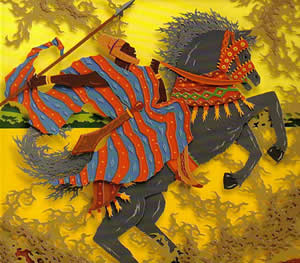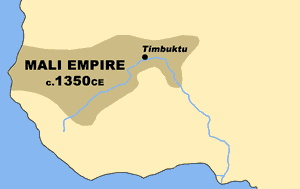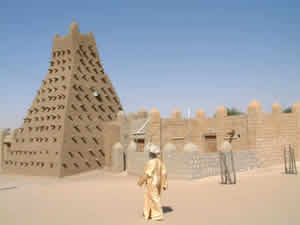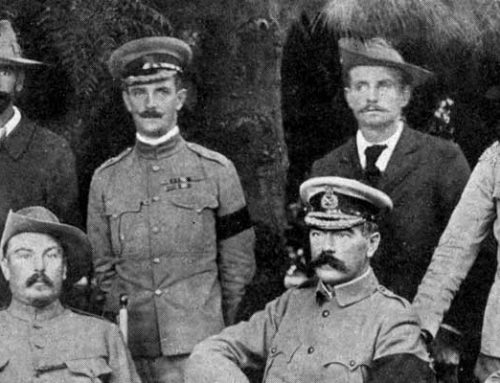The griots of West Africa still tell the 700-year-old story of a sickly boy named Sundiata, who grew up to become a great warrior, defeated a brutal enemy, and united the Mandinka people. Sundiata’s father ruled a small kingdom within the empire of ancient Ghana. A prophet told Sundiata’s father that if he married an ugly woman, their son would become a mighty king, so he married a hunchbacked woman named Sogolon.
Sundiata was unable to walk for the first seven years of his life. His disability caused Sundiata and his mother to be ridiculed by his older half-brothers. When the king died, Sogolon took Sundiata to the kingdom of Mema. In Mema, Sundiata grew up to become a respected advisor of the king.

Sundiata
Sundiata Keita (c. 1217 – c. 1255) was a Mandinka warrior and the founder of the Mali Empire.
While Sundiata and his mother were away, a warlord named Samguru conquered the Mandinka people. Samanguru was a cruel ruler. He felt it was his privilege to carry off Mandinka women. His taxes were high, and he failed to maintain law and order along the trade routes that once prospered in West Africa.
Remembering the prophecy that preceded Sundiata’s birth, the Mandinka sent messengers to find Sogolon and her son. The Mema king helped Sundiata assemble an army to liberate the Mandinka people and urged his advisor to return to his homeland. Sundiata defeated Samanguru in the Battle or Kirina in 1235. He then became mansa, or king, of a new empire that we know today as Mali. Mali means “where the king resides.”

Ancient_Mali_map
Mali grew into an empire during the rule of Sundiata’s grandson, Musa. It reached its greatest extent about 1350.
Sundiata proved himself to be a great warrior, but he was less interested in power than in once again making West Africa a safe place to travel and trade. Most merchants and traders in West Africa at that time practiced Islam. Sundiata converted to Islam, but only as a gesture of goodwill to the merchants and traders. To his people, Sundiata presented himself as a champion of traditional West African religion.
Mali had become a prosperous nation by the time of Sundiata’s death. His successors made Mali the largest empire in West Africa, spreading the Mandinka language and culture throughout West Africa.
Resources
Mr. Donn has an excellent website that includes a section on African History.

Djinguereber_Mosque
The Djinguereber Mosque is Timbuktu’s most famous landmark. The original mosque was constructed in 1327, during the reign of Mansa Musa.




